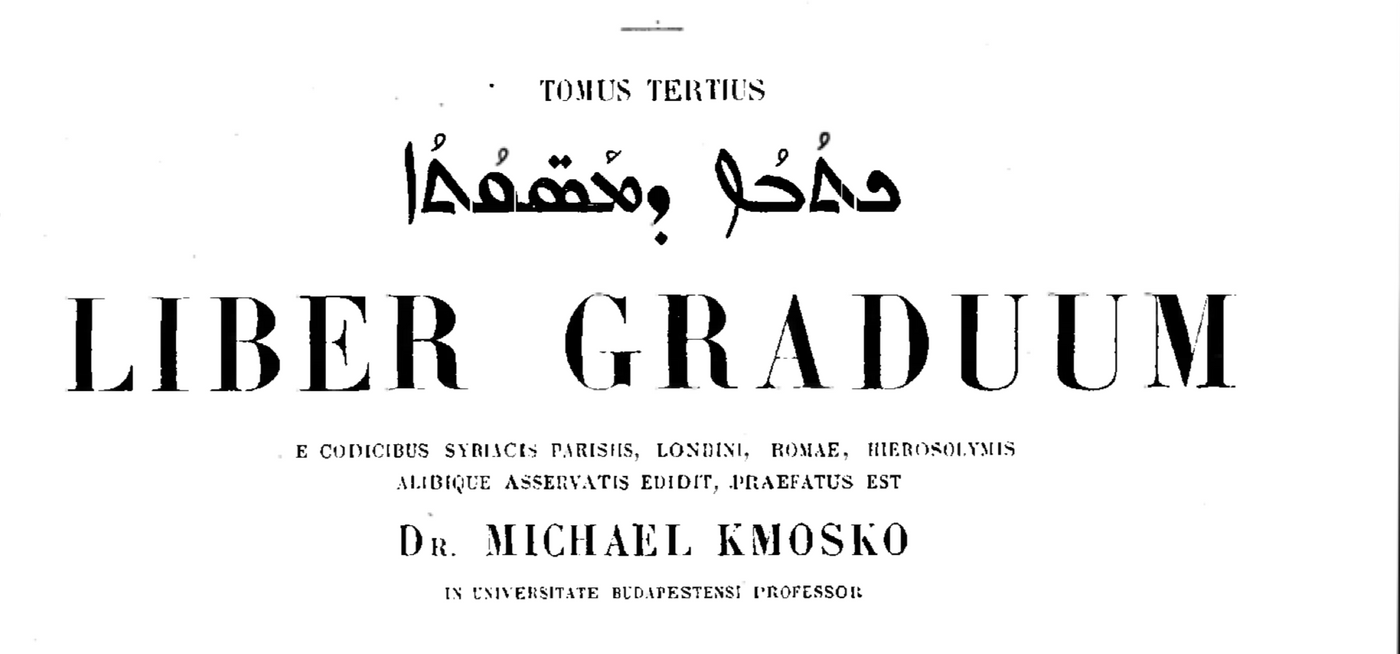
2021至今,伦敦大学亚非学院(SOAS)在读博士 2019-2020,波士顿学院,神学硕士,主修叙利亚传统 2015-2018,波士顿圣十字架希腊正教神学院,主修希腊教父灵修。
《步書》介紹袁永甲譯

譯自:
Robert A. Kitchen , “Book of Steps,” in Gorgias Encyclopedic Dictionary of the Syriac Heritage: Electronic Edition , edited by Sebastian P. Brock, Aaron M. Butts, George A. Kiraz and Lucas Van Rompay, https://gedsh.bethmardutho.org/Book-of-Steps .
《步書》介紹(Book of Steps Liber Graduum, Ktābā d-massqātā )
凡例:
- 一手和二手文獻不做翻譯,以方便按圖索驥
- 凡翻譯的人名,地名,書名等都用()註明英文或敘利亞文原文,若譯者要做進一步解釋,則加(按:…)
(按:《步書》是見證早期敘利亞靈修傳統的重要書籍,其中12篇堪稱經典,筆者會分享部分譯作節選,以供讀者品鑑。此篇乃介紹《步書》的學術性論文,凡研究《步書》者,皆可按圖索驥,順藤摸瓜之。)
正文:
其成書時間在四世紀中葉到公元430年。該書討論靈性生活和追求做完全人,由30篇敘利亞論文( memre ) 和一篇介紹文( mamllā ) 組成. 匿名的作者在論文極少提及歷史或地理細節,但提及他所在的修道團體位於伊拉克東北部,接近小扎布河(the Lesser Zab River)。
該書無標題。其拉丁名( Liber Graduum)是由邁克•可莫斯科(Michael Kmosko)在1926年做敘利亞(連同拉丁譯文)校勘本時起的,表明苦修的步驟( massqātā ) :為了去基督天上之城,人必須爬陡峭的路. 該詞步驟在論文中只提到兩次,論文19和20。可莫斯科(Kmosko )用了十五種手稿,其中只有三種手稿含有超過5個論文的內容。
可莫斯科認為該書主要是4世界中晚期彌賽亞運動(按:即敘利亞異端祈禱派,該派認為人可以通過祈禱直接在心裡領受恩典,無需教會聖禮)的一手文獻。這種論調被哈舍(I. Hausherr )接受,並佔據學術界30年之久。 20世紀50年代,阿索•哦伯思(A. Vööbus)挑戰了該書的祈禱派特質,並告知學者,該書見證了敘利亞早期靈修傳統。關注該書的其他方面的學者有聖靈論(A. Guillaumont), 教會論(R. Murray), 人論和祈禱(A. Kowalski), 結構(L. Wickham)和基督論和苦修主義(D. Juhl).
30篇論文長短不一,主題多樣:涉及解經,講道,苦修方法。貫穿全書主題的是基督徒的兩種生活狀態:正直人uprightness ( kenutā ) 和完全人或大人perfection or maturity ( gmirutā ) ,以及那些要過兩種生活的人正直人t ( kene ) 和完全人( gmire ).
寫作於修院團體之前,《步書》作者試圖對抗對完全者中標準和熱情的頹勢。書的前半部分介紹蒙召為正直者和完全者的規條。後半部分包含各類主題,最後六個論文指出正直者的合理性。
論文的題目如下:編輯者的序言。 1.作者介紹;2.論那些想要成為完全的人;3.論屬靈的與屬物的侍奉;4.論病人吃的蔬菜;5. 論孩子的奶;6.論完全者和他們持續的成長;7.論對正直者的誡命;8.論人當竭盡所能餵養窮人;9.論正直人和愛正直的人以及先知;10.論禁食以及身心的謙卑;11.論當律法擺在我們面前時,如何聽聖經;12.論教會隱秘和公開的使命;13.論正直之道;14.論正直者與完全者;15.論亞當婚姻的渴望;16.論人如何超過主要的誡命;17.論我們主的受難如何成為我們眾人的榜樣;18.論祈禱的眼淚;19.論完全者的分辨力;20.論去我們主城市路上的艱難步驟;21.論亞當樹;22.論審判;23.論撒旦、法老和以色列;24.論懺悔;25.論上帝與撒旦的聲音;26.論主為亞當建的第二條誡命;27.關於獲救的竊賊的歷史;28.論人魂不等同於人血;29.論攻克己身;30.論信心的誡命和對隱修的熱愛。
(按:為方便讀者找到對應英文,30篇論文題目如下:
1. Author's introduction; 2. About those who want to become Perfect; 3. The physical and spiritual ministry; 4. On the vegetables for the sick; 5. On the milk of the children; 6. On those who are made Perfect and continue to grow; 7. On the commandments of the Upright; 8. On one who gives all he has to feed the poor; 9. On Uprightness and the love of the Upright and the prophets; 10. On fasting and the humility of body and soul; 11. On the hearing of Scripture when the Law is read before us; 12. On the hidden and public ministry of the church; 13. By the same author on the ways of the Upright; 14. On the Upright and the Perfect; 15. On Adam's marital desire; 16. On how a person may surpass the major commandments; 17. On the sufferings of our Lord who became through them an example for us all; 18. On the tears of prayer; 19. On the discernment of the way of Perfection; 20. On the difficult steps which are on the road of the City of our Lord; 21. On the tree of Adam; 22. On the judgments which do not save those who observe them; 23. On Satan and Pharaoh and the Israelites; 24. On repentance; 25. On the voice of God and of Satan; 26. On the second law which the Lord established for Adam; 27. About the history of the thief who is saved; 28. On the fact that the human soul is not identical with the blood; 29. On the discipline of the body; 30. On the commandments of faith and the love of the solitaries.)
Primary Sources
- R. A. Kitchen and M. F. G. Parmentier, The Book of Steps. The Syriac Liber Graduum (2004). (ET, incl. further references)
- M. Kmosko, Liber Graduum (PS 3; 1926). (Syr. text with LT)
Secondary Sources
- K. Fitschen, Messalianismus und Antimessalianismus (1998), 104–128.
- A. Guillaumont, 'Situation et significance du Liber Graduum dans la spiritualité syriaque', in SymSyr I, 311–22.
- K. S. Heal and R. A. Kitchen (ed.), Breaking the mind: New studies in the Syriac Book of Steps (2014).
- D. Juhl, Die Askese im Liber Graduum und bei Afrahat (Orientalia Biblica et Christiana 9; 1996).
- N. A. Khalek, 'Methods of instructing Syriac-speaking Christians to care for the poor: A brief comparison of the eighth Mēmrā of the Book of Steps and the Story of the Man of God of Edessa', Hugoye 8.1 (2005).
- R. A. Kitchen, 'Conflict on the stairway to heaven: The anonymity of perfection in the Syriac Liber Graduum', in SymSyr VII, 211–20.
- R. A. Kitchen, 'Becoming perfect: The maturing of asceticism in the Syriac Book of Steps', JCSSS 2 (2002), 30–45.
- R. A. Kitchen, 'Syriac additions to Anderson: The Garden of Eden in the Book of Steps and Philoxenus of Mabbug', Hugoye 6.1 (2003).
- R. A. Kitchen, 'Slouching Towards Antioch: Biblical Exegesis in the Syriac Book of Steps', in Syriac and Antiochian Exegesis and Biblical Theology for the 3rd Millennium , ed. R. D. Miller (2008), 64–95.
- R. A. Kitchen, 'Making the Imperfect Perfect: The Adaptation of Hebrews 11 in the 9 th Mēmrā of the Syriac Book of Steps', in The Reception and Interpretation of the Bible in Late Antiquity , ed. L. DiTommaso and L. Turcescu (2008), 227–51.
- A. Kowalski, Perfezione e giustizia di Adamo nel Liber Graduum (OCA 232; 1989).
- A. Kowalski, 'Die Gebete im Liber Graduum', OCP 55 (1989), 273–282.
- D. Lane, 'The Book of Grades, or Steps', Harp 14 (2001), 81–8.
- R. Murray, Symbols of Church and Kingdom (1975), 34–6, 263–269.
- C. Stewart, Working the earth of the heart: The Messalian controversy in history, texts, and language to AD 431 (1991).
- A. Vööbus, 'Liber Graduum: Some aspects of its significance for the history of early Syrian asceticism', in Charisteria Ioanni Kõpp octogenario oblata (PETSE 7; 1954), 108–28.
- A. Vööbus, History of Asceticism in the Syrian Orient , vol. 1 (CSCO 184; 1958), 178–84, 190–7; vol. 3 (CSCO 500; 1988), 1–18.
- L. Wickham, 'The Liber Graduum revisited', in SymSyr VI (1994), 177–87.
Robert A. Kitchen
喜歡我的文章嗎?
別忘了給點支持與讚賞,讓我知道創作的路上有你陪伴。
發布評論…